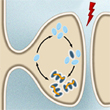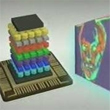Wednesday, 24 July 2013
Oligomers Help Us Keep Our Memories
 A protein whose molecules have the special ability to stack on top of one another, somewhat like egg cartons, and thus form short, highly stable chains (oligomers), may well play a key role in the mechanisms by which we maintain lasting memories.
A protein whose molecules have the special ability to stack on top of one another, somewhat like egg cartons, and thus form short, highly stable chains (oligomers), may well play a key role in the mechanisms by which we maintain lasting memories.
Indeed, there is always something magical about remembering something that you haven’t thought about in years. But physically speaking, in what form is the corresponding memory trace maintained in your brain over all that time? Neurobiologists know that the whole process occurs in the synapses (the plastic connections between neurons) and have described molecular mechanisms such as long-term potentiation that partly explain this plasticity. (more…)
Memory and the Brain, Mental Disorders | Comments Closed
Monday, 29 April 2013
A Microprocessor That Simulates a Synapse
 For decades now, cognitive scientists across the entire range from cognitivists to connectionists have been trying to use computers to model the learning abilities of the human brain. A team at MIT, headed by Dr. Chi-Sang Poon, has just taken a major step in this direction by designing a microprocessor that can simulate the functioning of a single synapse in the part of the human brain known as the hippocampus.
For decades now, cognitive scientists across the entire range from cognitivists to connectionists have been trying to use computers to model the learning abilities of the human brain. A team at MIT, headed by Dr. Chi-Sang Poon, has just taken a major step in this direction by designing a microprocessor that can simulate the functioning of a single synapse in the part of the human brain known as the hippocampus. (more…)
(more…)
Memory and the Brain | Comments Closed







